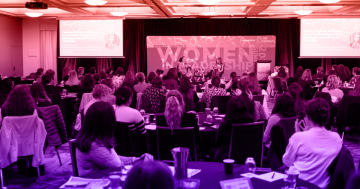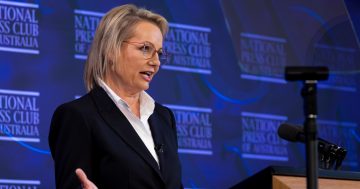Cathy Ngo* says that if education and hard work were enough, leadership would be culturally diverse, so we must work to fix the imbalance.

Photo: Christian Walker
I grew up in South-West Sydney, which is home to Australia’s most diverse communities.
The kids who excelled in school were usually from culturally diverse backgrounds.
Recent research from the Organisation for Economic Cooperation and Development (OECD) shows that the children of migrants from India, the Philippines and China were outperforming their Australian-born classmates — by significant margins.
NAPLAN results last year revealed that children who grew up speaking a language other than English were outperforming native English speakers in spelling in some States.
So why don’t the top leadership positions in Australia reflect this?
Research in 2018 into the cultural makeup of those who hold the 2,490 most senior leadership posts in Australia found that 95 per cent have an Anglo-Celtic or European backgrounds, which doesn’t come anywhere close to reflecting our general population.
It’s not as simple as getting a good education and working hard
Growing up where I did, I thought all I needed to do was work hard to get ahead.
Fast forward to my corporate career, where I’ve worked in HR, Corporate Affairs and Communications in some the largest organisations in the world and I thought I’ve made it!
But when it came to a seat at the leadership table, no matter how much I “leaned in”, or played “by the rules” of office politics, there was something holding me back.
And as it turns out, I’m not alone.
I’ve since learnt that there is strong evidence of a “double jeopardy” affecting women (when gender and cultural background combine), and standing in the way of us getting corporate leadership opportunities.
And it’s not hard to see this if you scan the leadership teams across major corporate and Government organisations, where the shades of colour gradually get paler the higher you move up the chain.
Why should we care about cultural diversity?
Former Prime Minister Malcolm Turnbull frequently boasted that Australia is the most successful multicultural society in the world.
Data from the 2016 Census show almost 50 per cent of Australians were born overseas or had a parent born overseas.
It’s been established for a long time that there are huge socioeconomic benefits of diversity and inclusion.
So why aren’t we seeing culturally diverse leaders?
In an ideal world, leadership teams would reflect contemporary Australia.
But this is wishful thinking.
Research shows there are a number of hindering factors.
The mindset that it’s only a “matter of time” before we see diversity.
That idea relies on an assumption that everyone plays on a level playing field and that the best person for the job gets the job.
A level playing field does not exist.
And knowing this makes a lot of people uncomfortable.
No one wants to admit privilege.
Poor recruitment practices and lack of development.
Recent research found that résumés with an Anglo name are three times more likely to be invited for interview, compared to candidates with a Chinese name.
Those with Chinese names who had an Anglicised first name doubled their chances of receiving a job interview.
These inherent biases need to be addressed.
Internally, organisations may not be promoting the best people for the job or providing opportunities for growth.
People have a natural tendency to hire and promote those similar to themselves, which then creates a homogeneous workforce.
Unconscious bias.
Unconscious biases are social stereotypes about certain groups of people that individuals form outside their own conscious awareness.
Our brains are wired to form views based on demographics (age, race, appearance, wealth, gender, etc).
Lack of cultural intelligence.
Smart leaders avoid focusing on cultural differences and instead develop cultural intelligence.
A person with high cultural intelligence has the capability to relate and work effectively in culturally diverse situations.
But unfortunately, not all leaders are aware of the need to improve their cultural intelligence.
There’s a lot of talk about quotas for women, so are quotas the answer to promote culturally diverse leaders?
Discussions on quotas invoke emotions of fairness and equality.
Personally, I shudder at the word quota.
I do, however, feel that if we’re going to discuss quotas, we need to consider quotas that extend beyond just gender.
Right now, it feels like cultural diversity is number two or three on the diversity agenda, when they should all be prioritised equally.
So, without quotas, what can we do?
Instead of introducing quotas, there are a few things organisations can consider, according to the Australian Human Rights Commission’s Blueprint for Diversity.
- Support and equip leaders. Provide authentic and humble leadership on cultural diversity. Support leaders from diverse backgrounds to be role-models and prepare leaders to respond to any push-back.
- Collect meaningful data, measure progress and ensure accountability. Collect data on cultural diversity and use this to inform deeper conversations and to measure diversity and progress.
- Consider having achievable targets and hold leaders to account. Targets are different to quotas in that they are aspirational. The experience of gender equality has demonstrated the power of having data and reporting on gender. If we’re committed to deepening our success as a multicultural society, there must consideration given to the better collection and reporting of comprehensive data on cultural diversity.
- Build an inclusive culture. An inclusive culture is one that accepts and respects the differing values and views as strength we all bring to the table.
Over to you
No matter what your cultural roots are, everyone can influence and lead change on cultural diversity if they are serious about reflecting the voices of our communities.
It’s worth noting that a leader doesn’t have to have formal authority over people.
Developing high cultural intelligence will make a huge impact to the people in your own sphere of influence.
It all starts with an inclusive mindset, authentic leadership and commitment to measuring progress through targets — not quotas.
* Cathy Ngo is a Sydney-based SEO copywriter and content creator.
This article first appeared at womensagenda.com.au.











